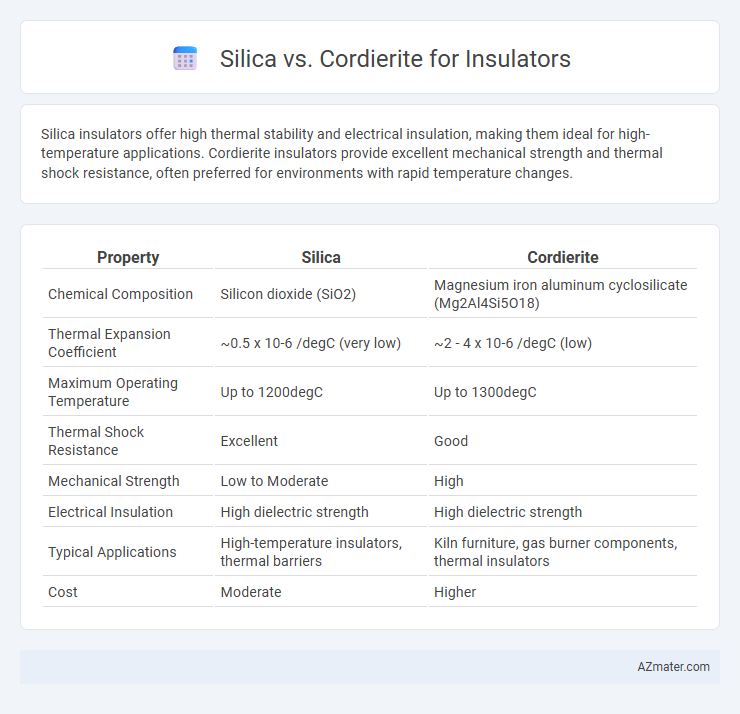Silica insulators offer high thermal stability and electrical insulation, making them ideal for high-temperature applications. Cordierite insulators provide excellent mechanical strength and thermal shock resistance, often preferred for environments with rapid temperature changes.
Table of Comparison
| Property | Silica | Cordierite |
|---|---|---|
| Chemical Composition | Silicon dioxide (SiO2) | Magnesium iron aluminum cyclosilicate (Mg2Al4Si5O18) |
| Thermal Expansion Coefficient | ~0.5 x 10-6 /degC (very low) | ~2 - 4 x 10-6 /degC (low) |
| Maximum Operating Temperature | Up to 1200degC | Up to 1300degC |
| Thermal Shock Resistance | Excellent | Good |
| Mechanical Strength | Low to Moderate | High |
| Electrical Insulation | High dielectric strength | High dielectric strength |
| Typical Applications | High-temperature insulators, thermal barriers | Kiln furniture, gas burner components, thermal insulators |
| Cost | Moderate | Higher |
Introduction to Silica and Cordierite Insulators
Silica insulators, primarily composed of silicon dioxide, offer excellent electrical insulation properties and high thermal stability, making them suitable for high-temperature applications in electronics and power systems. Cordierite insulators, made from a magnesium iron aluminum cyclosilicate mineral, provide superior thermal shock resistance and low thermal expansion, which enhances durability in harsh thermal environments such as automotive and industrial equipment. Both materials deliver critical insulation performance, but silica excels in electrical insulation while cordierite is favored for mechanical strength under thermal stress.
Material Composition and Structure
Silica insulators are primarily composed of silicon dioxide (SiO2) with a high purity crystalline structure that offers excellent thermal stability and electrical insulating properties. Cordierite insulators consist of a magnesium iron aluminum cyclosilicate (2MgO*2Al2O3*5SiO2) with a unique hexagonal crystal lattice, providing superior thermal shock resistance and low dielectric loss. The distinct molecular arrangements of silica and cordierite influence their performance, with silica excelling in high resistivity and cordierite favored for mechanical strength under rapid temperature fluctuations.
Thermal Properties Comparison
Silica insulators exhibit excellent thermal shock resistance with a low thermal expansion coefficient around 0.5 x 10^-6 /degC, making them ideal for high-temperature applications up to 1200degC. Cordierite insulators offer superior thermal stability and a thermal expansion coefficient of approximately 2.5 x 10^-6 /degC, enhancing durability under rapid temperature fluctuations and prolonged exposure up to 1300degC. The lower thermal expansion of silica reduces stress-induced cracking, whereas cordierite's combination of moderate expansion and thermal conductivity balances insulation performance and structural integrity in demanding thermal environments.
Mechanical Strength and Durability
Cordierite insulators exhibit superior mechanical strength compared to silica, making them more resistant to cracking under thermal stress and mechanical impact. Silica insulators offer excellent thermal shock resistance but tend to be more brittle, reducing their overall durability in high-stress applications. Cordierite's enhanced durability and toughness make it the preferred choice for industrial and automotive insulators requiring long-term reliability.
Electrical Insulation Capabilities
Silica exhibits excellent electrical insulation properties with a high dielectric strength and low electrical conductivity, making it ideal for high-voltage insulator applications. Cordierite, while offering good thermal stability and moderate dielectric strength, generally has lower electrical insulation capabilities compared to silica. Consequently, silica is preferred in environments requiring superior electrical insulation performance.
Thermal Shock Resistance
Cordierite exhibits superior thermal shock resistance compared to silica due to its low thermal expansion coefficient and excellent dimensional stability at high temperatures. Silica, while having good thermal insulation properties, is more prone to cracking under rapid temperature changes because of its higher thermal expansion. This makes cordierite a preferred choice for insulators in applications subject to frequent and extreme thermal cycling.
Cost and Availability
Silica insulators generally offer lower material costs and higher availability due to abundant raw materials and simpler manufacturing processes, making them a cost-effective choice for mass production. Cordierite insulators, while more expensive, provide superior thermal shock resistance and durability but are less widely available due to more complex synthesis requirements and limited natural sources. The decision between silica and cordierite often hinges on balancing upfront material cost against long-term performance and supply chain consistency.
Typical Applications in Industry
Silica insulators are widely used in high-temperature applications such as electric arc furnaces and glass manufacturing due to their excellent thermal shock resistance and high melting point. Cordierite insulators find common usage in automotive catalytic converters and kiln furniture, benefiting from their low thermal expansion and good mechanical strength. Both materials serve critical roles in industrial thermal management, but silica excels in extreme heat environments while cordierite is preferred for thermal cycling and structural stability.
Environmental and Safety Considerations
Silica insulators exhibit excellent thermal stability and chemical resistance, minimizing environmental pollution through reduced hazardous byproducts during production and disposal. Cordierite offers superior thermal shock resistance and lower thermal expansion, enhancing safety by reducing the risk of cracking or failure in high-temperature applications. Both materials support eco-friendly manufacturing processes, but cordierite's durability often translates to longer service life and less frequent replacement, contributing to sustainability.
Choosing the Right Insulator: Silica vs Cordierite
Silica insulators offer excellent thermal shock resistance and high dielectric strength, making them ideal for high-temperature electrical applications where rapid temperature changes occur. Cordierite insulators provide superior mechanical strength and lower thermal expansion, which enhances durability and dimensional stability in harsh environments. Selecting between silica and cordierite insulators depends on balancing thermal performance requirements with mechanical robustness to ensure optimal efficiency and longevity in electrical insulation systems.

Infographic: Silica vs Cordierite for Insulator
 azmater.com
azmater.com